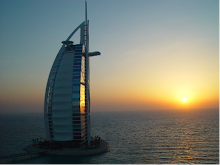Qatar has a unique vision for the future of its younger generations. in 1995, Sheikh Hamad bin Khalifa Al-Thani of Qatar established the Qatar Foundation as a private, non-profit organization with the goal of sponsoring and funding education, science and community development. The Sheikh has noted that the country's greatest resource is the potential of its people, and investment in the expansion of the nation's education system is a key priority in the Qatari culture. The current chairperson of the Foundation is the wife of his highness, Sheikha Al-Missend.
The flagship project of the Foundation is the further development of Doha's Education City, which currently hosts branch campuses of 6 American Universities. These branches include Carnegie-Mellon, Georgetown, Texas A&M, Virginia Commonwealth, Cornell and Northeastern. Two Canadian universities have also opened campuses in Education City as well.
With the world's highest GDP per capita, a booming economy and a record number of immigrants, this is a valuable investment on behalf of Doha. A high national literacy rate is crucial in today's globalizing world, especially if a small nation is considering competing in the international arena with players such as neighboring UAE and Bahrain.
In a recent article in Penninsula Qatar, the leading English news source in the country, it was announced that the Ministry of Education would be dissolved by 2010. This is a part of the education reform process currently underway.
This highlights significant progress for Qatar, and displays a very socially responsible move for the Sheikh.
In Dubai, the recent opening of Academic City in May of 2006 marked the city's push to "become the new global academic destination." With construction underway on land that will soon accommodate 25 international universities, and provide top-notch education to over 150,000 students, Sheikh Muhammad of Dubai may very well place his city on the map of academia. There are already smaller branches of international universities, such as the American University of Dubai, within the city center. Dubai's Academic City will boast research firms and institutions responsible for developing cutting-edge technology and medical research that rivals that of many Western universities. Chairman of the Dubai Education Council, Ahmed bin Bayat was recently quoted as stating, "There is no doubt that the main challenge that our region faces is the challenge of development in the information age, and the most significant characteristic of this age is the human aspect." With the tremendous economic growth the region has experienced, it is evident that Dubai is capable of attracting scholars and students from every corner of the globe. Similar to the Qatar Foundation, the Dubai Education Council is responsible for the investment, development and accreditation of their institutions.
It is fascinating that Dubai has chosen to "group" their development centers. This certainly makes construction and navigation throughout the region more efficient. Dubai Sports City and the Dubai International Finance Centre (located at the base of the Burj Dubai) are just two examples of multi-billion dollar projects funded by the Sheikh as well as significant support from foreign investors. The promotion of education and global centers of higher learning will certainly create a more well-rounded appeal for the city of Dubai. It is not appropriate to compare Qatar's Education City and Dubai's Academic City in terms of the levels of education that will be provided, as both locations will boast branches of the world's top universities, each featuring an array of specific areas of study and multi-million dollar institutions.
Thursday, April 10, 2008
Subscribe to:
Post Comments (Atom)



No comments:
Post a Comment